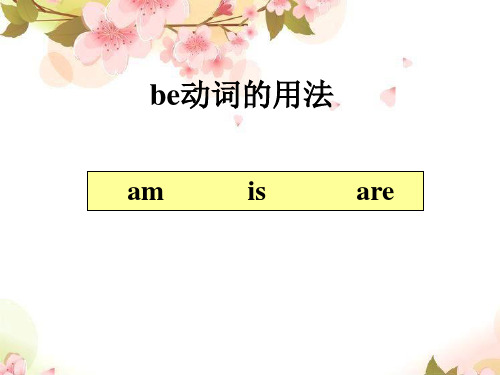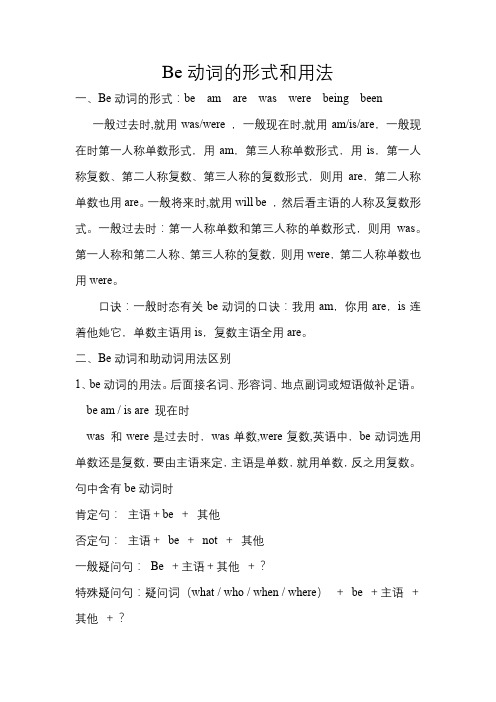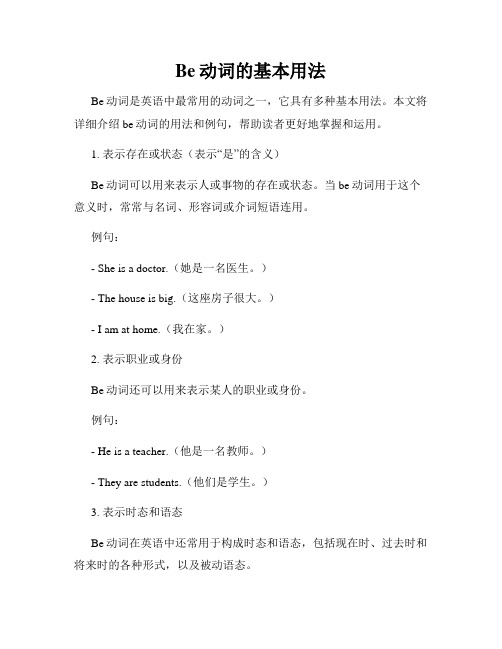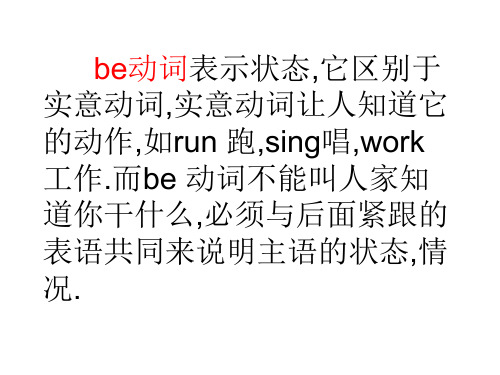Be动词&助动词练习题
be动词知识点

be动词知识点一、be动词的形式。
1. 基本形式。
- be动词在一般现在时中有三种形式:am、is、are。
- am:第一人称单数I(我)作主语时,be动词用am。
例如:I am a student.(我是一名学生。
)- is:第三人称单数(he他、she她、it它)作主语时,be动词用is。
例如:He is my brother.(他是我的哥哥。
)She is a teacher.(她是一名教师。
)It is a cat.(它是一只猫。
)- are:第二人称单数you(你)、第一人称复数we(我们)、第二人称复数you (你们)、第三人称复数they(他们/她们/它们)作主语时,be动词用are。
例如:You are my friend.(你是我的朋友。
)We are in the same class.(我们在同一个班级。
)You are good students.(你们是好学生。
)They are my parents.(他们是我的父母。
)2. 过去形式。
- be动词的过去式有两种:was和were。
- was:第一人称单数I和第三人称单数(he、she、it)在一般过去时中,be动词用was。
例如:I was at home yesterday.(我昨天在家。
)He was ill last week.(他上周生病了。
)She was happy.(她很高兴。
)It was a sunny day.(那是一个晴天。
)- were:第二人称单数you、第一人称复数we、第二人称复数you、第三人称复数they在一般过去时中,be动词用were。
例如:You were late.(你迟到了。
)We were in Beijing last year.(我们去年在北京。
)You were so kind.(你们很善良。
)They were at the park.(他们在公园。
)二、be动词的用法。
be动词用法总结

be动词的种类
第三人称单数(He or She or It)配合is使用。 句型解析:She(He, It) is +……
She is a good girl. She is short . She is a teacher.
• Be的用法口诀 I用am;you,we ,they 都 用are,
is连着he,she,it; 单数名词用is,复数名词全用are。
Be的用法
• 连系动词be是am, is, are三者的原形,一般 不直接出现在句子中,而是以am, is, are的 形式出现。因此建议用歌谣熟记be的用法:
5. I __a_m____ from Guangdong.
6. Lucy __is___ an English girl. 7. She _i_s___ in Class Two this year.
8. You __a_r_e_ our Chinese teacher this term.
-The End-
Thank you!
be动词的用法
am
is
are
be动词的种类
be动词包括“am”, “is”, “are”三种形式。 第一人称单数(I)配合am来用。 句型解析析:I am+…
I am twelve . I am slim. I am a student. I am a boy.
be动词的种类
第二人称(You)配合are使用。 句型解析:You are+…
be动词的种类
人称复数 (we /you/they)配合are使用。 句型解析:We (You, They) are +……
Be动词的形式和用法

Be动词的形式和用法一、Be动词的形式:be am are was were being been一般过去时,就用was/were ,一般现在时,就用am/is/are,一般现在时第一人称单数形式,用am,第三人称单数形式,用is,第一人称复数、第二人称复数、第三人称的复数形式,则用are,第二人称单数也用are。
一般将来时,就用will be ,然后看主语的人称及复数形式。
一般过去时:第一人称单数和第三人称的单数形式,则用was。
第一人称和第二人称、第三人称的复数,则用were,第二人称单数也用were。
口诀:一般时态有关be动词的口诀:我用am,你用are,is连着他她它,单数主语用is,复数主语全用are。
二、Be动词和助动词用法区别1、be动词的用法。
后面接名词、形容词、地点副词或短语做补足语。
be am / is are 现在时was 和were是过去时,was单数,were复数,英语中,be动词选用单数还是复数,要由主语来定,主语是单数,就用单数,反之用复数。
句中含有be动词时肯定句:主语+be +其他否定句:主语+be +not +其他一般疑问句:Be +主语+其他+?特殊疑问句:疑问词(what / who / when / where)+be +主语+其他+?如:I am a teacher.You are right.She is 16 years old.My father is at home.The students are playing games.My teacher was ill yesterday.There is a picture on the wall.There are two books on the table.be动词用法歌:我用am,你用are,is 连接他她它。
单数名词用is,复数名词全用are。
变疑问,往前提,句末问号莫丢弃;变否定,更容易,be后not莫忘记;疑问否定任你变,句首大写莫迟疑。
Be动词的基本用法

Be动词的基本用法Be动词是英语中最常用的动词之一,它具有多种基本用法。
本文将详细介绍be动词的用法和例句,帮助读者更好地掌握和运用。
1. 表示存在或状态(表示“是”的含义)Be动词可以用来表示人或事物的存在或状态。
当be动词用于这个意义时,常常与名词、形容词或介词短语连用。
例句:- She is a doctor.(她是一名医生。
)- The house is big.(这座房子很大。
)- I am at home.(我在家。
)2. 表示职业或身份Be动词还可以用来表示某人的职业或身份。
例句:- He is a teacher.(他是一名教师。
)- They are students.(他们是学生。
)3. 表示时态和语态Be动词在英语中还常用于构成时态和语态,包括现在时、过去时和将来时的各种形式,以及被动语态。
例句:- She is reading a book.(她正在读一本书。
)- They were studying yesterday.(他们昨天在学习。
)- We will be there tomorrow.(我们明天会到那里。
)- The book is written by him.(这本书是他写的。
)4. 表示感觉或状态的变化Be动词有时也用来表示感觉或状态的变化。
在这种情况下,be动词通常与形容词连用。
例句:- He is getting better.(他越来越好了。
)- The weather is becoming colder.(天气变得越来越冷了。
)5. 表示出生和血缘关系Be动词还可以用于表示出生和血缘关系。
例句:- I am from China.(我来自中国。
)- They are brothers.(他们是兄弟。
)总结起来,be动词具有表述主语存在或状态、职业身份、时态语态、感觉状态变化以及出生血缘关系的基本用法。
通过熟悉和掌握这些用法,我们可以更准确地表达自己的意思,使文章或对话更加流畅和自然。
be动词

be动词be动词be动词,意思和用法很多,一般的意思是:是,此种用法,有多种变化形式,is,am,are,was,were,being,been,to be.另外,be动词还有成为的意思。
根据句子中不同的人称、数和时间,型态,应该选择相应的be动词。
意思“Be”除了原形的“be”之外,还有另外七种形式:am, is, are, been, being, was, were.要看语句的时态:如果是一般过去时,就用was/were如果是一般现在时,就用am/is/are如果是一般将来时,就用will be然后看主语的人称及复数形式:第二人称单数也用were一般现在时:第一人称单数形式,用am第三人称单数形式,用is第一人称复数、第二人称复数、第三人称的复数形式,则用are第二人称单数也用are口诀:一般时态有关be动词的口诀:我用am,你用are,is连着他她它,单数is,复数are.一般将来时:will bewill在一般情况下相当于be going to,表示将要做什么,两者之间有细微差别will更口语化点,be going to表示有可能马上要着手去做的事情.will后面加动词原型,am /is /are的原型是be,所以will be就是表示将要成为,将要是……例如:i will be a mother.我将要成为母亲了.还有一种情况是will后面要跟被动语态了,也会出现will be 的形式.例如:she will be fired.她将被炒鱿鱼了.will be 和will区别前面是将要成为,将要是什么,后面加动词原形。
后者是将要做什么,后面跟形容词。
will be doing sth和will do sth区别前面是将来进行时,将来某个时刻正在做某事后面就是一般将来时表示将来打算做某事用法be (be/is/are/am/was/were)[bi:]vihe is, we are, you are, they are (缩略式I'm, you're, he's, we're, you're, they're), (否定缩略式I'm not, isn't, aren't), 过去时I was, you were, he was, we were, you were, they were (过去时否定缩略式wasn't, weren't),过去分词been,现在分词being 英语的“be”是个特殊动词;有些语言,如马来文等,并没有“be”这样的动词。
be动词的三种基本形式为

be动词的三种基本形式为:am, is, are
be动词的含义
1 是(表状态)
1. 2
2, 在(表存在,位置)
主词+be动词一般来说be动词要根据主词的人称来选择。
(如下表)
be动词的否定
含be动词(am, is, are)的肯定句在be动词后面加not,即可变成否定句时。
肯定句:主词+am/is/are +.......
否定句:主词+am/is/are +not+.......
be动词可以跟not缩写在一起
is not =isn't
are not = aren't
be动词的疑问句
1.在谓语是be动词的句子中,将be动词移到主词前,句尾加问号,即可构成疑问句
格式:
肯定句:主词+am/is/are+.......
疑问句:Am/Is/Are+主词 +.......?
2.be动词开头的一般疑问句,可用Yes或No回答,而答句中的主词需要用代名词(I she he they we 等)代替
肯定回答:Yes,主词+am/are/is.
否定回答:No, 主词+am/are/is+not。
英语中的be动词

一般将来时: will be
口诀:一般时态有关be动词的口诀 我用am,你用are,is连着他她它, 单数语用is,复数主语全用are
而实意动词是这样的: He runs every morning.他每天跑 步. You go to school.你上学, I stand.我站着. 凡是不能表达具体动作的,一般用 be动词.
在英语语法中,be动词意思和 用法很多,一般的意思是:是, 此种用法,有多种变化形式,is, am,are,was,were,being, been,to be. 另外,be动词还有成为的意思。 根据句子中不同的人称、数和时 间,型态,应该选择相应的be动 词。
be动词表示状态,它区别于 实意动词,实意动词让人知道它 的动作,如run 跑,sing唱,work 工作.而be 动词不能叫人家知 道你干什么,必须与后面紧跟的 表语共同来说明主语的状态,情 况.
如 I am a boy.我是一个男孩. He is tall.他个子高. It is Sunday today.今天星期日.
要看语句的时态: 如果是一般过去时,就用was/were 如果是一般现在时,就用am/is/are 如果是一般将来时,就用will be 然后看主语的人称及复数形式:
一般过去时: 第一人称和第三人称的单数形式, 则用was 第一人称和第二人称、第三人称 的复数,则用were
一般现在时: 第一人称单数形式,用am 第三人称单数形式,用is 第一人称复数、第二人称、第三 人称的复数形式,则用are
be动词的8种形态

be动词的8种形态
be动词有8种不同的形态,分别是:
1. 现在时(am/is/are):表示现在正在进行或存在的状态,例如“I am happy”(我现在很开心)。
2. 过去时(was/were):表示过去曾经发生或存在的状态,例如“He was sick yesterday”(他昨天生病了)。
3. 常态被动式(am/is/are + 被动语态):表示当前正在被动承受某种行为或状态,例如“The cake is being made”(蛋糕正在被制作)。
4. 过去被动式(was/were + 被动语态):表示过去曾经被动承受某种行为或状态,例如“The book was being read”(书曾被阅读)。
5. 将来时(will be):表示将来某个时间点的状态,例如“I will be busy tomorrow”(我明天会很忙)。
6. 将来进行时(will be + 动词的ing形式):表示将来某个时间会持续进行的状态,例如“He will be studying all night”(他会通宵学习)。
7. 现在完成时(have/has been + 动词的ing形式):表示过去一段时间内一直持续的状态,例如“I have been studying for 5 hours”(我已经学习了5个小时了)。
8. 将来完成时(will have been + 动词的ing形式):表示将来某个时间点之前已经一直持续的状态,例如“I will have been working here for 10 years”(我将在这里工作10年)。
- 1、下载文档前请自行甄别文档内容的完整性,平台不提供额外的编辑、内容补充、找答案等附加服务。
- 2、"仅部分预览"的文档,不可在线预览部分如存在完整性等问题,可反馈申请退款(可完整预览的文档不适用该条件!)。
- 3、如文档侵犯您的权益,请联系客服反馈,我们会尽快为您处理(人工客服工作时间:9:00-18:30)。
Be动词练习题
1. There ________ (be) many monkeys in the mountain.
2. There_________(be)a beautiful garden in our school.
3. There _________(be)some water in the glass.
4. There __________(be)some bread on the table.
5. _______(be)Tom ___________(read) a book now?
6. Where ________(be) your friends yesterday?
7. When _________ (do) your father usually _________ (go) to work?
8. How old __________ (be)you last year?
9. Which dog ________ (be) yours?
10. Ten and two ________ (be) twelve
选择填空:
1. My brother ____ a teacher. He ____ his pupils very much.
A. is, like
B. is, likes
C. are, likes
D. are, like
2. A: How many days ____ there in a week?
B: There ____ seven.
A. is, is
B. are, are
C. is, are
D. are, is
3. The boy ____ ill today.
A. are
B. is
C. be
D. am
4. What _____ your father _____?
A. do, like
B. is, like
C. are, likes
D. does, like
5. _____ you go to school by bus?
A. Are
B. Is
C. Do
D. Does
6. When _____ your birthday?
A. are
B. is
C. do
D. does
7. Which ____ bigger, the sun or the moon?
A. are
B. is
C. be
D. ×
8. My teacher often _____ shopping on Sundays.
A. goes
B. gos
C. go
D. goed
9. Listen! The children_____________.
A. sings
B. are singing
C. is singing
D. is sing
10. Her voice ____ like my mother's.
A. sounds
B. sound
C. looks
D. look
11. It often rains and the crops ____ fast.
A. get
B. turn
C. grow
D. become
12. A: How are you ____ now?
B: Much better, thank you.
A. getting
B. feeling
C. making
D. turning
13. He _____ swimming.
A. don’t likes
B. doesn’t likes
C. not like
D. doesn’t like
14. What ______ they _____ on Saturdays?
A. does, does
B. do, do
C. do, does
D. does, do
15. Yang Ling______do exercise with____.
A. doesn’t, us
B. don’t, we
C. /, us
D. don’t, us
初中英语语法练习题:主谓一致
1. Each of you ______ responsible for the accident.
a. am
b. be
c. is
d. are
2. Each man and woman ______ the same rights.
a. has
b. have
c. had
d. is having
3. Every means ______ tried but without much result.
a. has been
b. have been
c. are
d. is
4. There ______ in this room.
a. are too much furniture
b. is too many furnitures
c. are too much furnitures
d. is too much furniture
5. The manager or his assistant ______ planning to go.
a. were
b. are
c. was
d. be
6. Not only I but also David and Iris ______ fond of playing basketball.
a. am
b. is
c. are
d. was
7. Neither Tom nor his parents ______ at home.
a. is
b. are
c. has
d. was
8. Either the dean or the principal ______ the meeting.
a. attends
b. attend
c. are attending
d. have attended
9. ______ was wrong.
a. Not the teacher but the students
b. Both the students and the teacher
c. Neither the teacher not the students
d. Not the students but the teacher。
